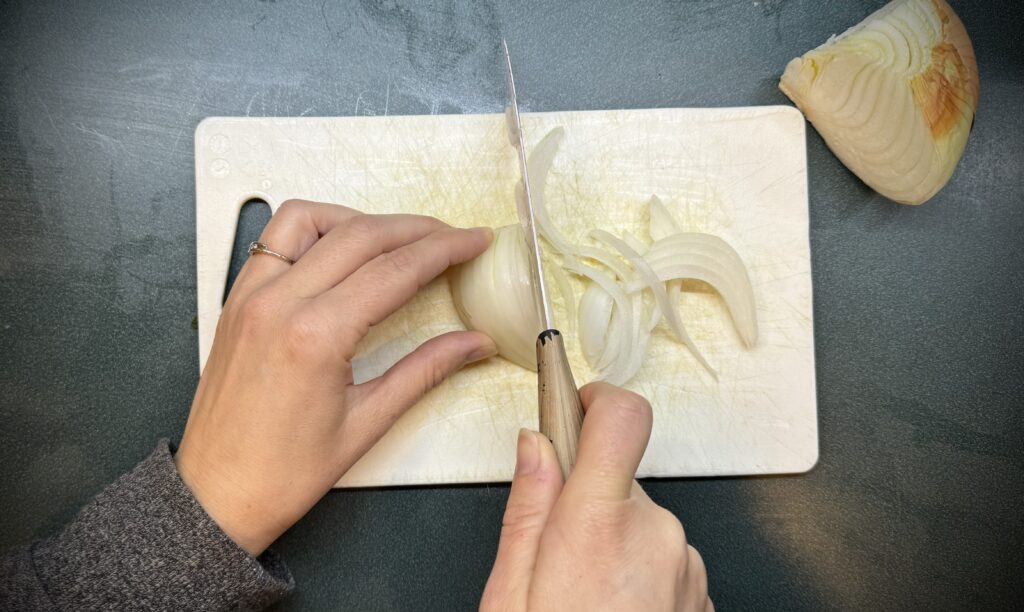
As we approach the holidays, it’s helpful to revisit the feelings that sometimes come up for people with vision loss during large gatherings involving cooking and food.
I brought this up in a previous post, “Just Keep Tossing the Salad,” to which my husband recently informed this naive, Midwest-raised girl on the innuendo of this phrase, much to my horror. All meanings and laughter aside, helping out in the kitchen when you’re not hosting can be a very vulnerable experience for those of us with vision loss.
While I often learn what doesn’t work from upsetting situations, I also learn what does work from positive experiences. My friend and neighbor, Gabe recently hosted a soup night for our book club, and I was struck by how included I felt in her kitchen compared with previous experiences.
When I first entered her home, I was greeted by the sounds of chopping, stirring and light chatter. I sat on a stool, nervous that I’d be told to just relax or motioned to stay out of the way, as I have been directed in many kitchens. To my delight, Gabe rattled off a few task options she still needed help with, and one included chopping tomatoes.
I chose that one.
Gabe placed a cutting board on the counter in front of me and handed me a knife. Besides when I’m at either my parents or Jenelle’s house, no one ever thinks to hand me a knife, and so I took it with a little soar of the heart. I know this may sound silly to many people, but feeling trusted with sharp objects feels like receiving a little nod of “you’re capable”, “you’re one of us”, and even “you belong here”.
This isn’t to say that those who are unable to use knives are incapable or don’t have a place at the table, so to speak,. It’s more about the assumptions that are made about people with vision loss. While there are nifty little utensils like food choppers to help people who aren’t skilled with knives, there are also techniques that people with vision loss can use when chopping with traditional knives. There are blind chefs like one of our fellow Daring Sisters, Regina Mitchell, who teaches non-visual techniques in the kitchen. And many may remember Master Chef Christine Ha, who is blind and won the 3rd season of Master Chef.
“I feel my way through the kitchen,” Christine says in one of her videos, which is unfathomable to some people living in a culture that places sight over every other sense.
I remember once cooking a holiday meal and a family member saying “You’re amazing cooking like this. I mean, you scare the shit out of me, but you’re amazing.” I remember the heat of shame rising up from somewhere deep, as I managed a half smile and a “Um, thanks.” To be seen as capable, as useful, as well, just ordinary, is something I think most humans crave, though there is a certain voracity with which I crave it. I’ve dug into my emotions on this one, and I don’t feel it comes from a place of pride or stubbornness. I believe it falls within the realm of dignity. It’s the same reason that an aging friend who is not as nimble on her feet these days recently told me she’d rather be allowed to fall once in awhile then have her adult children constantly hovering over her when she walks.
Again, this isn’t to say that depending on others equates to loss of dignity. On the contrary, there is often beauty and connection in dependence on one another. It’s when reliance is assumed or asserted as a necessity instead of asking or trusting that it becomes dicey.
So, if you give a twin a knife, she will not take over the kitchen or chop off her fingers. She will use the tactile techniques she has learned over the years. The tomatoes may not be perfectly symmetrical or be chopped at chef speed, but they will be added to the pot, and they’ll simmer just the same

I love this post. Thank you for sharing this story. Happy Thanksgiving!